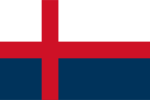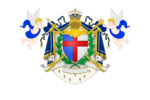Principality of Surland
Principauté du Surland Principality of Surland (en) | |
|---|---|
| Motto: Populi ad Humanitatem (Latin: For People and Humanity) | |
| Anthem: Ohhhh Surland! | |
| File:Moselle, France | |
| Capital and largest city | Corwiller |
| Official languages | Official : French & english |
| Demonym(s) | Surlandais / Surlandaise |
| Government | Constitutional Monarchy |
| Legislature | Uni-cameral Parlement |
| Establishment | 3rd of may 2015 |
| Population | |
• Census | 25 (2018) |
| Currency | de facto Euro |
| Time zone | (UTC+1) |
Website Government website | |
The Principality Of Surland is a micronation founded on May 3, 2015, in order to promote and share culture, education, science and humanist values. At the begining the Principality was the Consulat of Surland and changed into a monarchy after a referendum.
History

The Surland is a young micronation, which proclaimed its independance on the 3rd of May 2015. Surland is an open minded micronation, which supports enlightenment for culture, history, arts, researches, sciences. The Age of Enlightment [1] has a big influence on the culture of Surland and of course we are attached to the Human rights. The Principality of Surland encourages the free thinking and the engagement for the culture in general.
The Surland has Pastafarism as State religion, but accepts all the other religions.
The Republic
From the creation of Surland untill the 24th of march 2016, the Surland was a republic inspired by the french Consulate of 1799. There were 3 consuls at the head of State.A Provivisonal Constitution has been drafted at the creation of the micronation. The Constitution has been adpoted by the Parliament in September 2015. In this Constitution, the government has the possibility to change the polity of the Surland, to change the republic into a Monarchy.
During the time of the Republic of Surland known as The Consulat of Surland, the government mutiplied diplomatic contacts with other micronations. In September 2015 the consulate became very close of the Microfrancophonie.
The council of consuls decided to sign the treaty of Alcatraz, treaty written during the Polination 2015 in Italia, to show the concern that the Surland has for limiting the global warming.
the Council of Consuls awarded several micronationalists for their actions to promote micronation or for their policies.
The Principality
The 3rd febuary 2016 the Consulate of Surland hold a referendum about the politic system. the results were clears : 86% of people who voted, have decided to end the republic for a Principality. The Constitution of the 20th October 2015 provided this possibility. One month after the referendum, after the Parliament has voted the new constitution, the Surland became a Principality. The council of Consuls gave the power to the Prince of Würschingen.
The Prince of Würschingen took the title of Prince of Surland known as Clément Ier Prince of Surland.
The Prince of Surland decided to keep the same policy than the Council of Consul: staying away of micronational conflict and developing diplomatic relationship with other micronations. The other decision was to communicate more about the Surlandais culture.
The Principality of Surland decided to help other micronations to develop themselves by cooperation about communication or projects.
Since May 2016, the Principality is a member of the Microfrancophonie. This community of francophone micronations has for goal to make stronger links between the different francophone micronations.
The Treaty of Koenighoff
The 16th Of October 2016, the Prince of Surland signed the treaty of Koenighoff which created the Duchy of Wursberg. A semi-Autonomous territory on the north of the Principality of Surland. The Treaty of Koenighoff explains how the Duchy is organized and the links between the Principality and the new region. The Duchy has as obligation to respect the people rights from the contitution of the Principality of Surland. The Duchy is free to have is own policy and foreign relations with other micronation.
The Treaty gives the possibility of a total independance between the Surland and the Wursberg.
Independance of the Duchy of Wursberg
The 30 of October the Duchy of Wursberg after 11 days as semi-automous region has declared itself independent of the Principality of Surland. The declaration of independance, is based on the treaty of Koenighoff. The Duke reinfirmed the rights given to people in the treaty.
Reaffirmation of values
The 15th of February 2017, the Parliament voted the modofication of the Constitution. This modification has for goals to reinforce the rights and liberties of people, to fight against discrimination and hate speech. Since several months the Principality of Surland has been attacked for supporting equality between people without regarding, the religion, race, origin or sexual orientation by some micronations. This modification will make strongers the values of the Principality.
Peaceful Time
Since November 2017, the Principality have been more quiet, has been less present and active in Micronational Community. The will of the Government was to focus one the Principality itself. This time has been used to build a stronger culture in Surland. From 2019, the Principality of Surland has worked on different standard regarding administration to fit to the international standard as for inter-micronational agreements or recognitions based on Vienna agreements and international instruments or models of ratification and signature.
During the COVID-19 crisis in 2020, the Principality of Surland as suspended to obtention of Surland citizenship, and has made a lot of communication based of the scientific facts to avoid the propagation of the virus. This virus had obliged the Principality to create Emmergency State Law.
Dark Age
Since November 2021, the Principality of Surland has entered in a kind dark age. The micronation has still been ruled by the Prince, but presence on social networks and diplomacy actions with other micronations have been very small. The government has done the minimum. The Election in June 2022 has even not been organized. The Government and the Parliament are staying in place untill a decision to organize new election is acted. In July 2022, the question of changing the organisation of the State has been asked to the Prince to make the Principality more active. The possibility to change the Princely family and the Prince of Surland has been talked, and has been refused. Another possibility as given more power to the government or to turn into a republic as the creation of Surland has been asked too. The Prince has refused this possibilities too for now. Some talks are still on going.
Government and politics
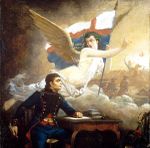
The Principality of Surland is a democracy, organized as a Constitutional Monarchy.
The Surland is based on the "Enlightment" wich means we place Human in center of everything. We believe in rights and liberties. the laws and government place social affair in center to create a place for everybody, a place for science and reflexion.
The government is constituted of the Prince of Surland and the High Representative. Both have executive powers. The Parliament has the legislative power, and the Prince has limited power regarding legislative power organization, he has the possibility to make decrees. But the Parliament has the right to cancel them or to change them. The Justice is bringing by independent judges elected by citizen. The Prince has limited power regarding the justice.
The power sepearation is inspired of different monarchies in Europe.
The Hierarchy of standards is respected in Surland. The Pricnipality has passed the test for the democracy index and reached the result of 8,74/10. This result means that the Principality is a perfect democracy.
The diplomacy and relation with other nations is the duty of the Prince of Surland. The foreign policy of The Surland is based on diplomacy. The Consulat then the Principality of Surland is against micronational war. The Surlandais government believes with a strong diplomacy it is possible to build something with other micronations and to avoid conflicts by talks.
The ecology is in center too, early during the republic, the government signed the treaty of Alcatraz. The Surland has the will to protect the planet. The Prince thinks that all little gesture can have an impact and everybody must to feel concern by the question of ecology.
The Prince
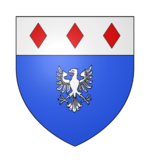
the Prince of Surland is the former of Surland, he was one of the three Consuls during the Republic time. The Constitution of the Consulat of Surland allowed to turn into a principality by strict rules : not enough politic activity, or by referendum. During the Republic, the title of Prince of Würschingen was hold by the first Consul. this title by the common law "l'engagement à la couronne" is hold by the next in line to the throne of Surland. When the Surland turened into a Principality, the Prince of Würschingen became the Prince of Surland and the title is now holding by the Princesse of Edling daughter of the Prince of Surland. The Surland is ruled by the Home of Würschingen.
The Prince is the Head of State of the Principality, sharing the executive power with the High Representative. The Prince is in Charge of the Diplomacy of Surland. He is the garantor and protector of the Constitution.
The High Representative
The High Representative is elected by the citizen and appoints the Ministers. He or she is elected for one year. The High Representative is in charge of the national policy, the Prince gives the head lines and the High Representative changes it in real policy.
The High Representative is helped in his tasks by the Minister that He appoints. Ministers and the High Representative are responsable of the Policy in front of the Prince.
The Parliament
There is one Parliament in Surland. The Parliament has legislative powers. The Prince of Surland has the possibility to make decrees, and the Parliament has the possibility to modify or change them.
The number of elected Parliamentarian is given by a law. Regarding the Constitution the Parliament can have between 1 and 51 Parliamentarians. They have a mandat for one year wich can be renewed.
The Parliament has in own organisation, by is own rules. But the process of law making is dictated by the Constitution. The parliamentarians have the possibility to create commission to work on specific topic.
The Prince has the right to disolve the Parliament. In this case new election will be anticipated.
The Institute of Surland
The Institute of Surland has been creates in April 2019. The role of this institute is to be a kind of thinktank for the Surland.
The main work is to make deep reflexion about various topics for the Principality can take position in accordance with it values. The Institute is independent and not leaded by politic.
The reports done by the Institute is an help and not guideline for the Parliament of the Government. This reports are not done to become public. But they can be published if the Parliament or the Government decide it.
The number of members is not fixed. It can evoluate depending of the topic's matter or the need.
Law and order
The Surland since it creation, respects the Hierarchy of norms, which means that all the legal acts don't have the same significance.
The most important law in the Surland is the Constitution, which organize the State and gives rights and duties to citizens and non -citizens in Surland.
The Constitution explains how the micronation is organized, how works the Government. It gives and protects the rights of all citizens and non-citizens of Surland.
The Referencis Corpus Legum is the basic law of Surland. It deepens the laws regarding everyday life, such as environment, duty or right of peaple, defense etc...
The Surland recognizes too the common law especialy for everything concerning the throne of Surland. The obligations of the Prince of Surland and of the first on the line of succession are written in the common law called "L'engagement à la couronne" this text explain how the Princes have to behave before and during their reign. If they don't respect this rules the Prince of Surland has to abdicate, and the prince of Würschingen can't become the Prince of Surland.
The Constitution
The Surland had 3 constitutions. The first one have been written at the creation of the Consulat of Surland in May 2015. This constitution had never been voted by the Parliament. During August 2015, the Council or Consul decided to modify the Constitution and to propose it by referendum. This constitution have been accepted the 20th of October 2015.
The second constitution is the real first one adopted by Surlandais population the 20th of October 2015. But was applicated since August 2015, the major differences with the first version are that the Parliament has only one Chamber and give the possibility of the Consulat of Surland to become a Principality in some cases. The title of prince of Würschingen has been created in this occasion. The pretender of the Surland's Throne holds this title. The constitution is done to protect the Surland population against the possibility that the Pricinpality becomes a dictatorship or absolute monarchy.
The Third constitution is the evolution of the second one when the Surland became a Principality the 24th of march 2016. the rights and duties of people did not change. All the power of the Council of Consuls have been given to the Prince of Surland which was until the 24th of march the prince of Würschingen. A new Prince of Würschingen has been designated. This Constitution explain too the duties of the reigning House and the succession for the throne. In General the Constitution is reviewed once a year to make it evolve regarding the problem or lake of regulation with the situation that the Principality had to face during the year. At each changement a vote to validate the changes is organized by the government to the parliament.
L'engagement à la Couronne
The "engagement à la Couronne" is a commun law done espacialy for moral and duty of the Prince of Surland and for the Prince of Würschingen. the bothe prince must respect this engagement. in case of non respect, they have, for the Prince of Würschingen to renounce of his title (so to the throne) and for the Prince of Surland to abdicate. The constitution organize the power and the rule for succession of the Surland throne, this law organize the duties and valors of the Princes. It is not possible to modify this text, by the Prince or by the Parliament. This text guarantees liberties for the Surland people and the obligation that the Prince has to them.
The establishement act of the Principality of Surland
The Establishement act have been redacted and signed the 24th of march 2016 to end the Consulat politic system and to announce the Principality. This act is the link between the second and the third constitution, gives the power to the Prince of Würschingen who becomes the prince of Surland and remaind the obligation for the prince to respect the "engagement de la Couronne". This text gives too some limits of powers to the Prince. As it's not a part of the Constitution, the Prince or the Parliament can not change any word of this text. it guarrantees the liberties of the second Constitution. And Oblige the Prince to take decision only for the best of Surland's people.
The Law
The Principality has kept all the principles for the Republic time. The Basic law did not change. The Consular Degree n°6 which is the decree organize all the rights, the organisation, the justice and administration of Surland has been kept by the Principality. The power that the Consuls had, has been transferred to the Prince. The Spirit of the Law did not change and continue to evolve in direction of the liberty and the protection of the citizen of the Principality of Surland.
Geography
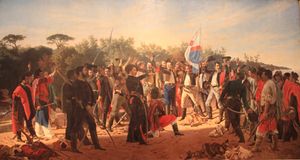
The Principality is constitued of five little islands on the Moselle river in the north-east of France not far away of the Luxembourg border.
Names of the five islands are : Corwiller, Locaria, Murange, Naurange sur Moselle, Schlumburg. Each island is an administratif region. The law is the same for all the islands. there is no local law. The Surland is not an federation.
The Corpus Legum gives the possibility that orther lands or islands become Surlandais. It is even possible to have have local laws in this new areas. The only limit is that the local laws have to respect the Surland's Constitution and general laws.
Each Island has it own coat of arms. But they don't have any flag. it was decided that the Surland will recognize only one flag : the national flag.
The Capital is Corwiller, and all the administratif powers are there.
Military
The Military of Surland is organized with a Grand Headquarter and 2 regular regiments (1er Régiment de Ligne and 1er Régiment de marche). A thrid regiment has been created the "1er Régiment de Garde" which has for duty the protection of the Prince and Institutions of Surland.
Each citizen has to serve the country for one year, either as a civilian in a medical service, emergency service and NGO or within the military as a reservist. This is guaranteed by the Basic Law.
The Principality of Surland has a non-violent policy and don't take part in micronational wars. the Surland's army has more a honorific and representive role.
In 2020, the Prince decided to create a Princely War College with a aim to teach the basic of tactic and strategy especially in XVIII and XIX centuries.
Religion
The State religion in Surland is the Pastafarisme [2]. All religions are welcome in Surland. The 19th September wich is the national day of Surland is in the same time the one of the main Holydays for Pastafarian people, the international Pirate day.
Each Friday is an Holyday in Surland, which is celebrating with pasta or beer.
The Pastafarism, even if it is the State religion, does not have any impact or influence on the laws or on the Government. there is a real separation between the State and the religion. The Patron Saint of The Principality of Surland comes from the Pastafarism religion.
Culture
The culture in the Principality of Surland is based on french culture influenced by some other countries and the "Enlightment". The rights are something very important with limits which are the interdiction of spread violence and hate. The Government push people to learn and to create, to be able to think by themself.
The Pastafarism has a big influence on culture, puting the science and knowlegde in middle of everything.
The tradional culture with mythes and legends comes from the east of France and Germany. As for exemple the Mythe of "Sotré" little dwarf who cleans home when people are not present and who can steal food and hide items.
The Principality of Surland has a culture of peace and try to stay away from conflicts.
Languages
The Principality of Surland, and the Consulat of Surland before, has two official languages, French and English. French is used for all the administrative acts. English by the constitution is used for the diplomatic exchanges. In everyday life, english is more utilised by the population to communicate. The government uses english and french for official information.
It is requiered to obtain the Surlandais citizenship to know at least one of both languages.
As French is one of the two offcial languages, The Principality of Surland is member of the MicroFrancophonie.
Symbols
The Surland has many symbols, the primary symbols are in the Constitution as the National Flag, the Coat of Arms of the Principality and the Coat of Arms of the Prince. It has been decided that the Principality and the Prince would have different Coat of Arms. This fact makes the Principality unsual. There is a real separation between the State and the Prince.
The National Flag
The National Flag exists since the creation of Surland. It has been used by the Republic and lately by the Principality. It is often used in different Art and Graphic Art. It is the Symbol which is the most known of the Surland.
The National Flag is White and Blue witha Red scandinavian cross. It is called "the Flag of three colors"
The National Coat of Arms
The National Coat of Arms has evolued with time, the actual version is from 2018. The Shield did not changed since the creation of the Coat of Arms. It has the colors of the flag and the cross. The representation of the Flag is turned in 90° in clockwise.
On actual version, the there the Crown of Surland.
The Coat of Arms is on the official documents and often used in official graphic art as propaganda.
The Prince's Coat of Arms
The Prince Coat of Arms is a national Symbol which is in the Constitution. It is acted the the Shield belong to the actual family at the Head of Surland. In case of another Family would take the Head of the Micronation, the coat of arms will change.
The Coat of Arms of the Prince, the Würschingen shield with a blue mantel and the Surland Crown, has the three national colors of Surland.
And some official documents (with the National Coat of Arms beside) it is possible to see the Coat of Arms of the Prince. This coat of arms is on the graphic art and of course on the Personal Standard of the Prince.
Cuisine
The Surlandais Cuisine is rich because of the influence of the diversity of the population. A lot of dishes come from east of France or Germany. We can give as example: Schnitzels and "cordons bleus", sausages, sauteed potatoes, spatzles, cheese, cheese pie (not cheesecake). There are influence of Italia too with pastas, of Russia with pelmenies. Onions are very present in dishes too.
Meals are often accompaned with beer or wine. The bank of Mosel produces a lot of white wine.
Art
The Surland, since the creation, has a strong culture of Art with paint. Most of the paints from Surland are representation of national symbols. This reprensatations are helping to create the feeling to belong to a community through values and symbols. The flag of Surland is often represented, which makes it the symbol the most knew through the micronational community.
Art of the national symbols is one of the politic used to develop the intermicronational profile of the Principality. The different paints are a vector to spreas the values and the singularity of the Principality, giving a unique culture and different from the other micronations.
National Holidays
| Name | Date | Notes |
|---|---|---|
| New Year's Day | 1 January | Beginning of the calendar year |
| International Worker's day | 1 May | |
| The Fundation day | 3 May | Day of the creation of Surland |
| The Platypus Day | 2 June | Celebration of the Animal of Surland |
| Knowledge day | 30 June | |
| National Day | 19 September | National day of Surland |
